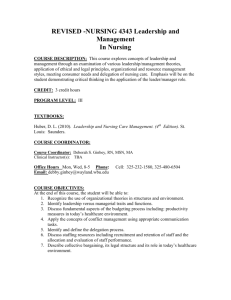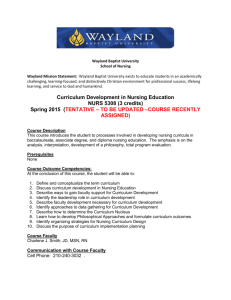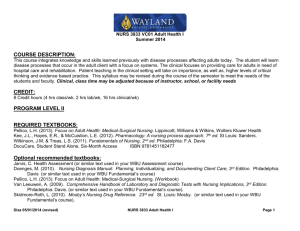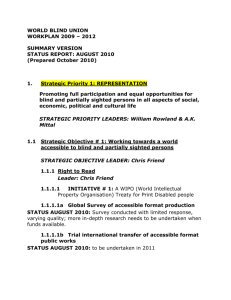Health Assessment - Wayland Baptist University
advertisement
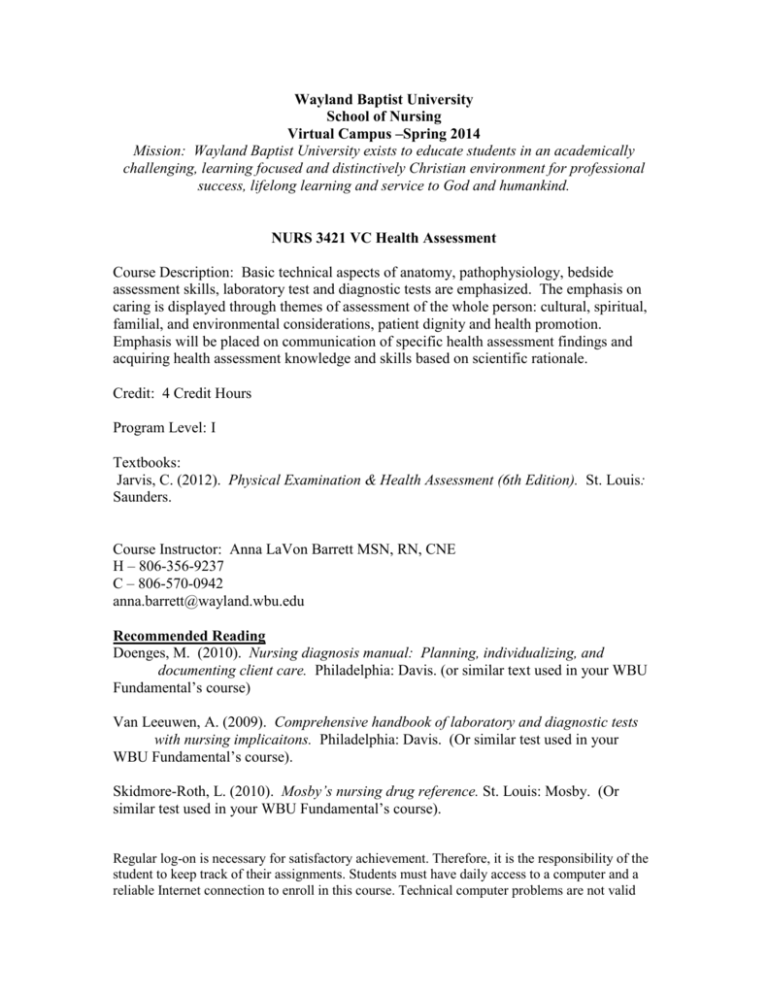
Wayland Baptist University School of Nursing Virtual Campus –Spring 2014 Mission: Wayland Baptist University exists to educate students in an academically challenging, learning focused and distinctively Christian environment for professional success, lifelong learning and service to God and humankind. NURS 3421 VC Health Assessment Course Description: Basic technical aspects of anatomy, pathophysiology, bedside assessment skills, laboratory test and diagnostic tests are emphasized. The emphasis on caring is displayed through themes of assessment of the whole person: cultural, spiritual, familial, and environmental considerations, patient dignity and health promotion. Emphasis will be placed on communication of specific health assessment findings and acquiring health assessment knowledge and skills based on scientific rationale. Credit: 4 Credit Hours Program Level: I Textbooks: Jarvis, C. (2012). Physical Examination & Health Assessment (6th Edition). St. Louis: Saunders. Course Instructor: Anna LaVon Barrett MSN, RN, CNE H – 806-356-9237 C – 806-570-0942 anna.barrett@wayland.wbu.edu Recommended Reading Doenges, M. (2010). Nursing diagnosis manual: Planning, individualizing, and documenting client care. Philadelphia: Davis. (or similar text used in your WBU Fundamental’s course) Van Leeuwen, A. (2009). Comprehensive handbook of laboratory and diagnostic tests with nursing implicaitons. Philadelphia: Davis. (Or similar test used in your WBU Fundamental’s course). Skidmore-Roth, L. (2010). Mosby’s nursing drug reference. St. Louis: Mosby. (Or similar test used in your WBU Fundamental’s course). Regular log-on is necessary for satisfactory achievement. Therefore, it is the responsibility of the student to keep track of their assignments. Students must have daily access to a computer and a reliable Internet connection to enroll in this course. Technical computer problems are not valid excuses to miss assignments, exams, or other due dates. Students should plan ahead to have access to a back-up computer at a family member's home, friend's location, local school, or local city library. When technical problems occur, send an e-mail to your instructor immediately to explain the difficulty. If you cannot use e-mail, call your instructor to explain the problem. Review the Guidelines for the Virtual Campus on the Virtual Campus homepage at http://www.wbu.edu/academics/online_programs/default.htm. Be sure to read the netiquette link under the getting started on-line link. Respectful students bring a strong work ethic to the course. They are expected to log-on to the class regularly, be prepared for class, and be attentive to discussions and online chats. A shared respect for one another is essential to the academic integrity and a comfortable learning environment. Everyone must do their part to maintain an environment of openness and civility that encourages and honors the intellectual achievement. COURSE OBJECTIVES: At the end of this course, the student will be able to: 1. Explore health assessment of the whole person, including developmental tasks and health promotion across the life cycle. 2. Focus on cultural care environment and assessment, interviewing and complete health history gathering and the social environment of mental status assessment and domestic violence assessment. 3. Use interviewing skills to obtain a nursing health history and entry level nursing physical assessment. 4. Apply concepts of history-taking, interviewing and physical assessment of the client throughout the life cycle and to distinguish between abnormal findings and normal variations. 5. Describe the steps of the nursing process. 6. Utilize critical thinking and reasoning skills and reflection to identify functional health patterns and develop a basic nursing plan of care for clients in collaboration with the client and the interdisciplinary health care team. 7. Describe physical data-gathering techniques, how to set up the examination site, body measurement and vital signs, pain assessment, and nutritional assessment. 8. Apply concepts of developmental, cultural, and spiritual assessment. Identify holistic concerns when assessing the client. 9. Demonstrate a bedside nursing interview, general survey, and head to toe assessment and document findings. EVALUATION AND GRADING: A point system will be used to determine the grade in Health Assessment Course. A = 90-100 B = 80-89 C = 75-79 D = 70-74 F = 69 and below Four exams 40% of grade Discussion Board – two discussions (5 points each) and 5 check points (4 points each) 30% of grade Nutritional Screening Assessment Assignment 30% Choose an elderly individual (75 or older if possible) and do a nutritional assessment using the following two tools from your Jarvis textbook. Page 179 figure 11-2 Mini Nutritional Assessment, and page 180 Table 11-3 Subjective Global Assessment (SGA). Also include a 24-hour recall as mentioned on page 180 in your assessment. Perform the nutritional assessment and write up your findings in a 2 page paper. Make sure you address each area of each tool. Grading: Mini Nutritional Assessment 25points Subjective Global Assessment 25points 24-Hour Recall 25points Paper – 2 pages, proper spelling, punctuation, grammar. 25points 100 total points. Guidelines for Posting Discussion Questions. The two discussions for week 2 and week 4 will be posted by the instructor on Monday. Your response is due by Tuesday midnight. Each discussion will be worth 5 points. In order to get the full 5 points you will need to: Answer the posted question with substantial evidence from the week’s readings. Use proper grammar and spelling. Reference as necessary. Your response needs to be at least 200-300 words. Throughout the week reply with a substantive response to other student’s discussion question answer thread (click on the student’s answer thread and then click reply for that post). The replies must be on 2 different days and you need to post at least 2 substantive responses (one each of the two days). The substantive responses must be posted by the end of the week Sunday midnight. Guidelines for Check Points In Week 5, 6, 7, 8, 9 you will find a check point assignment in the assignment tab on the course menu. There is a question for a short answer response. You must respond with a substantive answer which is referenced by your text. The question will open on Monday of the respective week and your response is due by Saturday evening at midnight. Each check point counts 4 points for a total of 20 points. This grade is included in your discussion grade – the total counting 30%. Once the check point closes you will not be able to post your answer and will not receive the 4 points. Course Outline Unit 1 Unit 2 Unit 3 Unit 4 Assessment of the Whole Person Approach to the Clinical Setting Physical Examination Integration of the Health Assessment *See course calendar for weekly readings, assignments and due dates. This course is heavily dependant upon your use of the textbook and online course tools. Read each chapter and work through the videos. The major means of assessment will be multiple choice exams. If you do the work – you will pass the exams!
